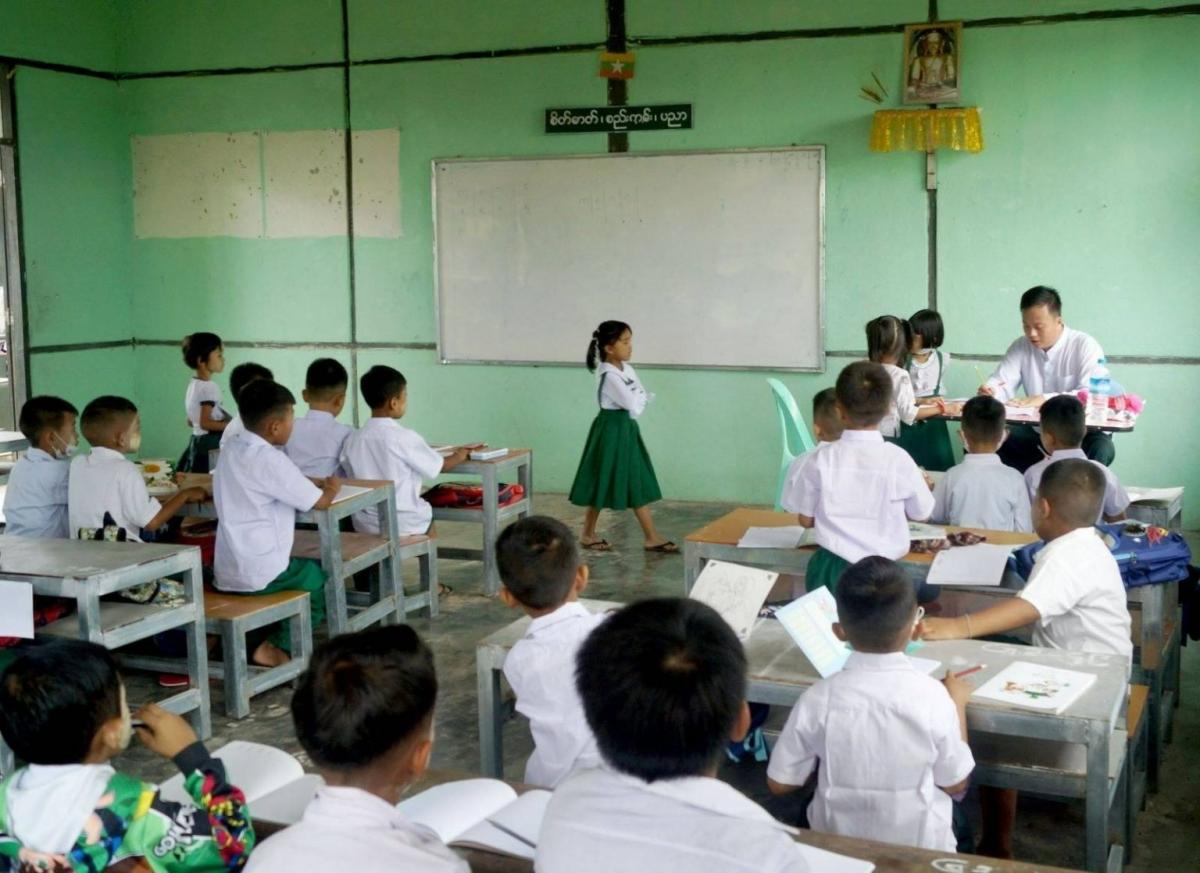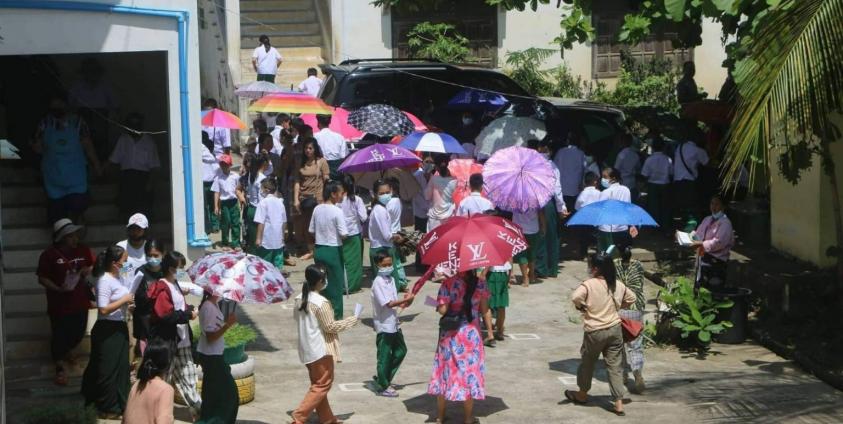“Everyone has the right to education – at least to study free of charge at the primary grade level.” The United Nations declared the basic human rights that everyone should be entitled to, the Universal Declaration of Human Rights, on 10 December 1948.
The United Nations urged its participating members to respect and obey the declaration and to educate their citizens about the declaration through the government schools and organizations.
The day the United Nations declared the Universal Declaration of Human Rights on December 10 was recognized as Human Rights Day, and there were 30 basic human rights in the declaration.
However, the Myanmar military government has been neglecting those basic human rights for many generations, and so it is not surprising to see that the Myanmar civilians’ human rights have been abused for decades.
“I would like to go to school, Mother.” “I would like to go to school, Father.” The ten years old Mg Thet Htoo (not real name) who is living in the Shan State capital city, Taungggyi, has recently been telling his parents about his wish to go to school, so as an eight years old daughter, Ma Thida.
Ko Kyaw Htoo and his wife were company employees, and they were doing fine financially. They could send their children to a local private school in Taunggyi. However, their salaries were cut a few months after the coup. The monthly expenses for the private school are now doubled, and they are having a hard time managing it.
“In the past, the monthly tuition fee was only 50,000 Kyat, the same applies to kindergarten. Currently, it has increased to 100,000 Kyat monthly. 200,000 Kyat for my two kids tuition fees plus the uniforms fees and stipends – it is quite a lot. We are sales employees and our salaries have been cut. We are worried about our children’s education,” the 35 years old Ko Kyaw Htoo told SHAN.
Along with the Spring Revolution and the civil disobedience movement (CDM), the advocacy not to send children to the military junta-managed schools during this crisis is still very strong.
During the NLD government, all schools nationwide were closed due to Covid-19 pandemic, and very few students went to school last year because of the protest against the coup and the Covid-19 pandemic.
Parents have been worrying about their children’s education because they could not study for the last two consecutive years. During this academic year, many parents have enrolled their children in both private and government schools. The NUG online based school has also seen an increase in the enrollment this year.
Even though preparations have been made for the children’s education, armed conflicts have been ongoing nationwide. Many civilian houses have been burned, and many have been arrested and killed. Over one hundred thousands people are being internally displaced according to the statement released by the United Nations.
Due to the Myanmar junta brutality across the country, civilians are facing all kinds of problems everyday. Meanwhile, a group of people are advocating not to send children to school under this military appointed education minister while rumors about the attacks on schools are spreading – the parents are in a difficult situation these days.
“During this crisis, it is not an issue for those who can afford to send their children to schools. There are local private schools and international private schools to choose from. However, it is a big issue for the lower income people, and those who are living in the rural areas. Even though NUG is providing online education from primary school up to high school, it is the truth that they cannot cover the whole country,” a former teacher, U Tin Htun Aung, who has been doing research about Myanmar education, told SHAN.
It is not fair only if those who are financially strong and have access to good internet are able to study during this Spring Revolution, and the curriculum drawn during the NLD government has not been amended by the military junta yet.
The above former teacher pointed out that the main problem is that the military junta troops are stationed at the public schools saying they are providing security for the students. Just like in the past, the students are used to meeting and greeting the generals to show that everything is fine in the country. Additionally, explosives are set up and the revolutionary forces are being blamed and accused so that their image is ruined.
Currently, educational departments are being targeted and on 30 May 2022, a bomb was exploded near the office of the township educational department in Nongkhio township, Northern Shan State. Due to the explosion, 8 education officers were injured and a headmistress of a primary school, Daw Saw Khin Khin Cho Hlaing, was killed.
According to the NUG statement released by the ministry of education on 3 June 2022, after the incident in Nongkhio, it is very clear that the military junta is neglecting the right to education and it is exploiting that for the political interest. We cannot think lightly and conclude that the terrorism act on the public schools and educational departments could be the Myanmar military junta doing. It is urged that the revolutionary forces respect the war ethics, and that it condemns any group that targets the public schools and educational departments.
However, the Matupi Education Board released a statement on 26 May 2022 that those who enrolled in the public schools managed by the military junta will be regarded as public traitors.
Moreover, the Mindat Chin Defense Force(CDF) has informed the public that teachers who are teaching at the schools run by the military junta will be punished.
According to the Global Coalition to Protect Education from Attack (GCPEA) report, there are more than 200 cases where the public schools are attacked and used as a military base after the military coup.
It has been found that not only the Myanmar military junta but also the other armed forces are attacking the education sector, and public schools and universities are being used for military bases. Those attacks that target the education sector must not be done by any armed groups mentioned in the GCPEA report.
Moreover, the People Defense Force (PDF) and the ethnic armed forces are accusing and condemning the Myanmar military junta for its air strikes and shelling that damaged the public schools; meanwhile, the Myanmar military junta is accusing the PDF and ethnic armed forces of planting explosives at the public schools.
The Myanmar military junta statement mentioned that the revolutionary forces have damaged over 300 public schools and killed over 30 civil servants due to the explosives being set up by armed forces. However, the statement did not mention how many civil disobedience movement (CDM) participating teachers are being detained by the junta.
For the academic year 2022-23, the Myanmar military government announced that all schools enrollment dates must be from 26 May – 1 June 2022. During this period, over 5.6 million students were enrolled in public schools, private schools, and monastic schools nationwide – it was stated in the military-owned daily newspaper, The Mirror, on 2 June 2022.

According to the data released by the junta, the Ayeyawaddy region has the highest number of enrolments, over 910,000 students, and Chin State has the lowest number of enrolments, over 20,000 students.
During the academic year 2021-22 managed by the military junta, the number of students enrollment was 5.3 million, meaning the current academic year has the enrollment increased by 0.3 million.
However, during the NLD government administration, the enrollment for the primary grades only were over 900,000 starting from the academic year 2017-2018 – according to the data released by the ministry of education.
If compared to the number of students enrolled across the country during the NLD government, it has decreased by 40 percent during this academic year managed by the junta even though the enrollment number is 5.6 million.
A former reacher, U Tin Htun Aung, pointed out that the total number students nationwide could be over 10 million, and that only half of the students, which is quite low, enrolled during this academic year managed by the military junta.
Currently, both the military junta and the revolutionary forces should not use the education sector as a tool or “hostage” to gain political interest. There are millions of households in Myanmar which do not have access to a cable internet, and they should be given an alternative to get access to education. Both sides should not make use of the education sector for political reasons and should not neglect the right to education – U Tin Htun Aung expressed his request.







